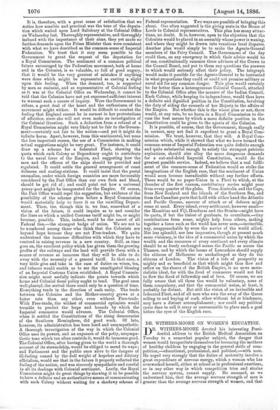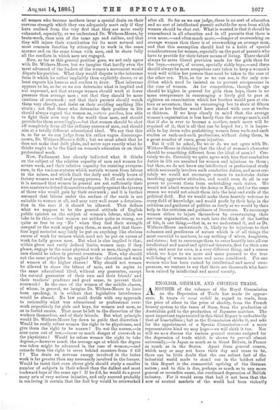DR. WITHERS-MOORE ON WOMEN'S EDUCATION.
DR. WITHERS-MOORE devoted his interesting Presi- dential address to the British Medical Association on Tuesday to a somewhat popular subject, the danger that women would incapacitate themselves for becoming the mothers of healthy children by engaging in the general strife of com- petition,—educational, professional, and political,—with men. He urged very strongly that the duties of maternity involve a great expenditure of nervous energy, which a woman who has overworked herself, either at school or in professional exertions, or in any other way in which competition tries and strains the nervous system, cannot supply. He assumed, as we understand him, that the average nervous strength of men is greater than the average nervous strength of women, and that
all women who become mothers incur a special drain on their nervous strength which they can adequately meet only if they have realised from the very first that they are more easily exhausted, especially, as we understand Dr. Withers-Moore, by brain-work, than men of the same age and calibre, and that they will injure their constitution for its most natural and most common function by attempting to work in the same manner and on the same terms with men, and to share fully all the conflicts in which men are engaged.
Now, so far as this general position goes, we not only agree with Dr. Withers-Moore, but we imagine that hardly even the most advanced of the leaders of the women's movement would dispute his position. What they would dispute is the inference from it which he rather implicitly than explicitly draws, or at least expects his hearers and readers to draw. That inference appears to be, so far as we can determine what is implied and not expressed, not that average women should work at lower pressure than average men ; not that they should be more cautious of overwork ; not that their parents should watch them very closely, and insist on their avoiding anything like strain ; not that those who determine their position in life should always regard the women as, eteteris paribus, less able to fight their own way in the world than men, and should provide for them accordingly,—but that women should be shut off completely from all the ordinary careers of men, and should aim at a totally different educational ideal. We say that this is, so far as we can judge from his rather vague discourage- ments, Dr. Withers-Moore's drift ; but we must admit that he does not make that drift plain, and never says exactly what he thinks ought to be the limit on women's education or on their professional work.
Now, Parliament has already indicated what it thinks on the subject of the relative capacity of men and women for severe work, and their relative capacity for resisting overpres- sure, in the various statutes which restrain women from labour in the mines, and which limit the daily and weekly hours of factory women as well as of young persons. In all such statutes, it is assumed that women in general are not sufficiently their own masters to defend themselves adequately against the tyranny of those who would gain by their overwork ; and it is further assumed that labour under the surface of the earth is not suitable to women at all, and may very well cause a deteriora- tion in the race if it should be allowed. That defines what we suppose to be the general attitude of English public opinion on the subject of women's labour, which we take to be this,—that women are neither quite as strong, nor quite as free to say No ' when they find their strength unequal to the work urged upon them, as men, and that there- fore legal restraint may fairly be put on anything like obvious excess of work for women which need not be put on excess of work for fully grown men. But what is also implied is that, within given and easily defined limits, women may, if they please, engage in the same physical work as men, though more care should be taken to prevent overstrain. Now, why should not the same principles be applied to the education and work of women of the higher classes ? Why should not women be allowed to share the labour of men, and to aspire to the same educational ideal, without any guarantee, except the natural guarantee of their own and their friends' and their teachers' prudence and good sense, to prevent their overwork ? In the case of the women of the middle classes, of whom, in general, we imagine Dr. Withers-Moore to have been speaking, it is evident that legislative interference would be absurd. No law could decide with any approach to rationality what was educational or professional over- work respectively for girls and boys, for women and men, so as to forbid excess. That must be left to the discretion of the workers themselves, and of their friends. But what principle would Dr. Withers-Moore lay down to guide that discretion ? Would he really refuse women the right to be physicians, and give them the right to be nurses ? Do not the nurses,—in nine cases out of ten,—incur as much danger of overwork as the physicians ? Would he refuse women the right to take degrees,—however much the average age at which the degree was taken might be advanced in the case of women,—and concede them the right to serve behind counters from 9 till 7 ? The drain on nervous energy involved in the latter work is far greater than any necessarily involved in the former.
Would he insist that even clever girls should study a smaller number of subjects in their school than the dullest and most backward boys of the same age ? If he did, he would do a great many acts of very serious injustice, and only succeed probably in rendering it certain that the dull boy would be overworked
after all. So far as we can judge, there is no sort of education and no sort of intellectual pursuit suitable for men from which women should be shut out. What is wanted is that it should be remembered in all education and in all pursuits that there is even more,—and often much more,—danger of overworking an average woman than there is of overworking an average man, and that this assumption should lead to a habit of special considerateness for women, especially on the part of parents who have to provide for their future means of living. There should always be more liberal provision made for the girls than for the boys,—except, of course, specially sickly boys,—and there should always be more scrupulous care taken to keep a woman's work well within her powers than need be taken in the case of the other sex. This, so far as we can see, is the only con- dition which need be insisted on to prevent overpressure in the case of women. As for competition, though the age should be higher in general for girls than boys, there is no more overpressure in encouraging a lively girl to pass at eighteen an examination which her brother would pass at six- teen or seventeen, than in encouraging her to skate at fifteen as far as her brother would have skated with ease at twelve or thirteen. If we keep clearly in mind that. the average woman's organisation is less hardy than the average man's, and that if she is ever to become a mother, much more will be required of it, that is all that can be hoped for ; it is impos- sible to lay down rules prohibiting women from such-and•such studies or such-and-such professions, without doing them, in a great number of cases, gross injustice.
But it will be asked, Do we or do we not agree with Dr. Withers-Moore in thinking that the ideal of woman's character should be something different from the ideal of man's ? Cer- tainly we do. Certainly we quite agree with him that combative duties in life are unsuited for women and injurious to them ; but then, we do not know any intellectual or professional study which necessarily involves such combative duties, and most cer- tainly we would not encourage women to undertake duties involving aggressive attitudes, and would even do all in our power to prevent them from undertaking such duties. We would not admit women to the Army or Navy, and for the same reason we would not admit them into the heat and strife of the political field. But we would make them heartily welcome to every field of knowledge, and would profit by their help in the criticism and guidance of politics as freely as we would by their help in the criticism and guidance of literature. To encourage women either to injure themselves by overstraining their nervous organisation, or to rush into the thick of the battles of life, is one thing,—that is, as we understand it, and as Dr. Withers-Moore understands it, likely to be injurious to that calmness and gentleness of nature which is of all things the most essential to mothers, to say nothing of wives, daughters, and sisters; but to encourage them to enter heartily into all our intellectual and moral and spiritual interests, first for their own sakes, and next for ours, is a very different thing, and a course
which we hope to see more and more pursued as the true well-being of women is more and more considered. For one woman who has been ruined by intellectual and moral over- pressure, we venture to say that there are thousands who have been ruined by intellectual and moral vacuity.



































 Previous page
Previous page